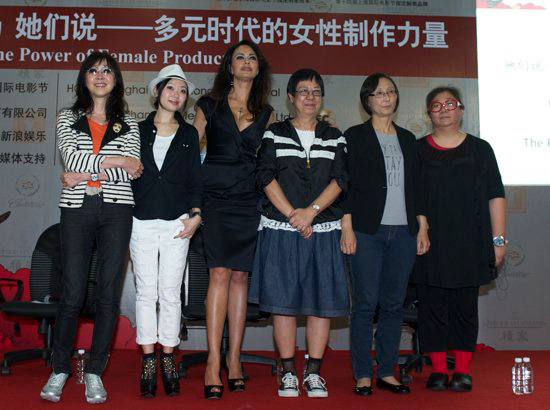For their films, what women want
 0 Comment(s)
0 Comment(s) Print
Print E-mail
CRI, June 17, 2011
E-mail
CRI, June 17, 2011
|
A forum with focus on "the power of female producer" is held Wednesday in Shanghai during the ongoing 14th Shanghai International Film Festival.[Photo: Agencies] |
Do you think filmmakers, intentionally or not, leave clues of their gender in films? Can you tell the director's gender by just watching a film?
When Kathryn Bigelow won the best directing Oscar, in 2010, for her masculine Iraq war drama, "The Hurt Locker", the media universally stressed the fact that she was the first woman to win the award in the Oscars' 82-year history.
Bigelow's win and her film have triggered heated debates regarding her gender and directorial style. People saw it as breaking news that a woman finally won a male-dominated award, especially because she won for a movie that is so atypical to films by other female directors.
The question is - Are we simply making an untrue assumption that female directors tend to identify gender differences when making their films? If not, why are there so few war or martial-arts movies from female directors?
During a Shanghai International Film Festival forum discussing what it was like for women working in film, some established women filmmakers said it was not a matter of gender difference.
"I like watching martial-arts movies," said Chinese director Ann Hui, "but I wouldn't feel comfortable directing one, because I have a poor sense of positioning [which is required for directing such films]. I don't know how to dance, and play very bad tennis. I think the reason why there are few women making such movies lies in individual differences, not in gender."
Hui's notable films like "The Postmodern Life of My Aunt" and the Golden Bear-nominated "Summer Snow" have an obvious focus on female characters. But she has also made films about men and history: "July Rhapsody" is about a man struggling with a midlife crisis; "The Romance of the Book and the Sword" is based on a wu xia novel by Louis Cha.
Mabel Cheung, another Chinese director attending the forum, shared the same interest in martial-arts movies, and said she would "definitely direct one" in her career.
Cheung worked as a producer on Sammo Hung's 1992 martial-arts film, "The Moon Warriors". Like Hui, she said gender difference plays little role in choosing the subjects for her films.
"It's not a question about gender. I think a film is like a child of the director. It inherits the characteristics of the director as an individual. My films for example are different from Ann Hui's. Her subjects are diversified. I tend to make films based on my personal history."







Go to Forum >>0 Comment(s)